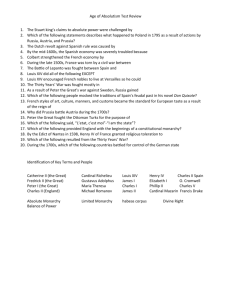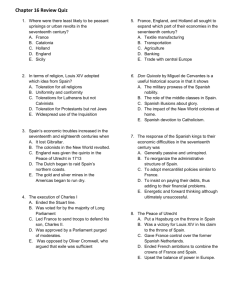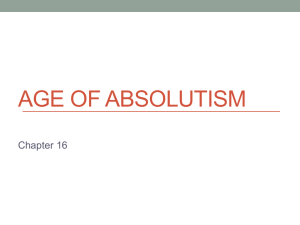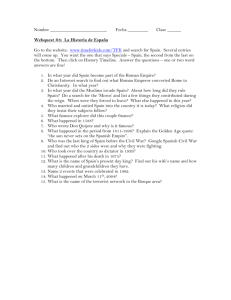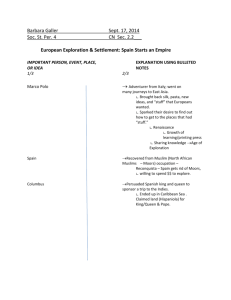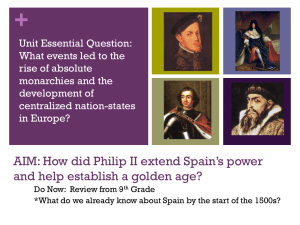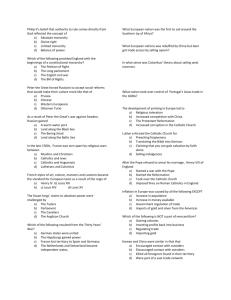The Age of Absolutism 1550-1800 Age of Absolutism : period after
advertisement
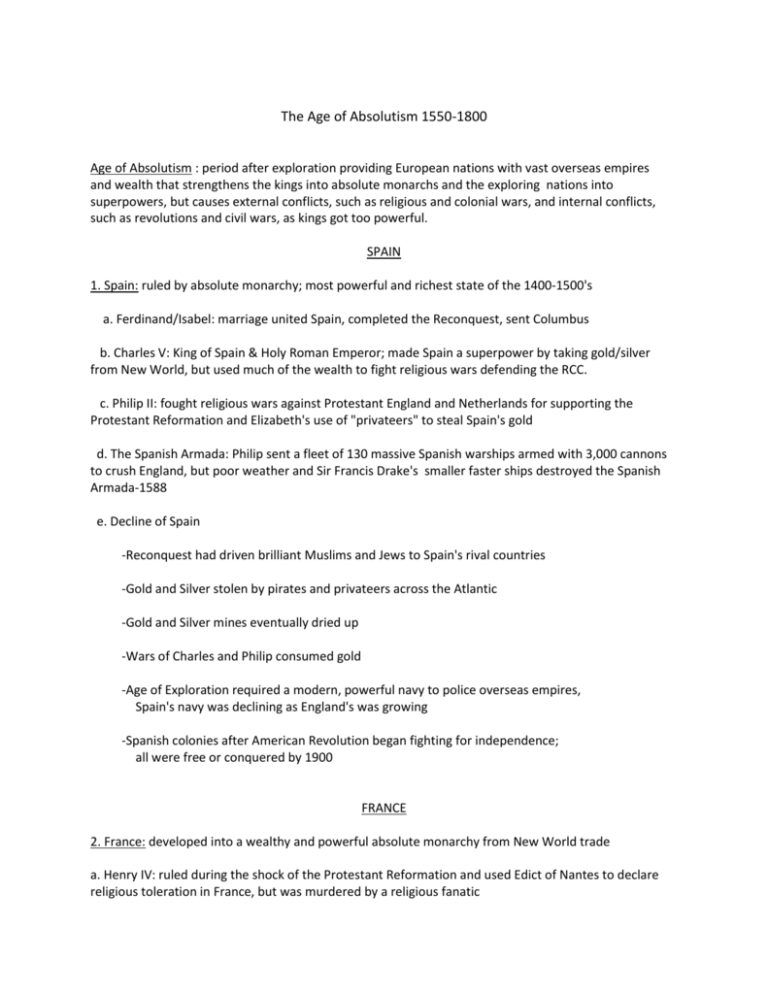
The Age of Absolutism 1550-1800 Age of Absolutism : period after exploration providing European nations with vast overseas empires and wealth that strengthens the kings into absolute monarchs and the exploring nations into superpowers, but causes external conflicts, such as religious and colonial wars, and internal conflicts, such as revolutions and civil wars, as kings got too powerful. SPAIN 1. Spain: ruled by absolute monarchy; most powerful and richest state of the 1400-1500's a. Ferdinand/Isabel: marriage united Spain, completed the Reconquest, sent Columbus b. Charles V: King of Spain & Holy Roman Emperor; made Spain a superpower by taking gold/silver from New World, but used much of the wealth to fight religious wars defending the RCC. c. Philip II: fought religious wars against Protestant England and Netherlands for supporting the Protestant Reformation and Elizabeth's use of "privateers" to steal Spain's gold d. The Spanish Armada: Philip sent a fleet of 130 massive Spanish warships armed with 3,000 cannons to crush England, but poor weather and Sir Francis Drake's smaller faster ships destroyed the Spanish Armada-1588 e. Decline of Spain -Reconquest had driven brilliant Muslims and Jews to Spain's rival countries -Gold and Silver stolen by pirates and privateers across the Atlantic -Gold and Silver mines eventually dried up -Wars of Charles and Philip consumed gold -Age of Exploration required a modern, powerful navy to police overseas empires, Spain's navy was declining as England's was growing -Spanish colonies after American Revolution began fighting for independence; all were free or conquered by 1900 FRANCE 2. France: developed into a wealthy and powerful absolute monarchy from New World trade a. Henry IV: ruled during the shock of the Protestant Reformation and used Edict of Nantes to declare religious toleration in France, but was murdered by a religious fanatic b. Louis XIII: nine year old inherited a divided and violent France -Cardinal Armand Richelieu: crushed power of the nobles and Protestants to make Louis XIII an absolute monarch of a unified and peaceful France. -30 Years War: religious war between Catholic Spain and Austria versus Protestant North German kingdoms and Netherlands; France helped Protestants to weaken Spain, but was very costly to France. c. Louis XIV: 5 year old inherited a powerful/unified France and made it a superpower -Cardinal Jules Mazarin appointed by Richelieu to be chief minister -Sun King: Louis XIV made France the wealthy, powerful, cultural, intellectual center of Europas important as the sun is to the galaxy -Palace of Versailles: most extravagant palace in Europe housed 10,000 people so Louis could directly control the lives of the feudal nobility -War of the Spanish Succession: Philip V, a grandson of Louis XIV, inherits the throne of Spain, so Louis XIV declares France and Spain united, but England goes to war to keep them separated to maintain a "balance of power" -Louis XIV's luxury and wars put France in debt so taxes and to rise -Never consulted Estates General about spending of tax money d. Louis XV: inherited high taxes and debt,but continued France's luxury, then lost 7 Years War which gave England Canada and split Louisiana between England and Spain, so France lost all New World money. e. Louis XVI: inherited higher taxes and higher debt, but continued France's luxury, supported the US in the American Revolution, which drove France further into debt and gained France nothing. f. French Absolute Monarchy was the most powerful in Europe, but was going bankrupt. ENGLAND 3. England: began developing Limited Monarchy since Magna Carta of 1215 and is slowly moving toward democracy; trade with new world is making England rich; island geography provides great defense from Spain & France and encourages a strong navy which will make England the world superpower until 1918 as Spain declines and Francegoes broke and begins French Revolution. a. Henry VIII: asked for Parliament's support of when the Act of Supremacy created the Church of England b. Elizabeth: powerful and popular queen for 45 years that established New World colonies and made England rich/powerful, protected Protestant Netherlands from Catholic Spain to keep access to continental Europe, defeated the Spanish Armada in 1588, but dies with no heir. c. James I: Scottish Stuart dynasty inherits throne promoting RCC & Absolutism, many Protestants flee to America to escape the unpopular James d. Charles I: Parliament demands him sign the Petition of Right, which gives full power of taxes to Parliament, but Charles refuses to sign and dismisses Parliament so he can rule as an absolute monarch e. English Civil War: Parliament forms an army of "roundheads" (disciplined Puritans) led by Oliver Cromwell to fight Charles's "cavaliers;" Charles is captured and beheaded which shocked Europe that a "divine right" king could be disposed of by the people; made Spain and France more resistant to limited monarchy f. The Commonwealth: Parliament abolishes monarchy and Cromwell attempts to form a republic, but England is lost after having continuous kings since William-1066 g. The Restoration: Parliament offers Charles II the throne to restore tradition h. James II: threatens return to RCC and Absolutism I. Glorious Revolution: Parliament invites William and Mary to rule England on the condition that they sign the English Bill of Rights which permanently makes Parliament supreme.

